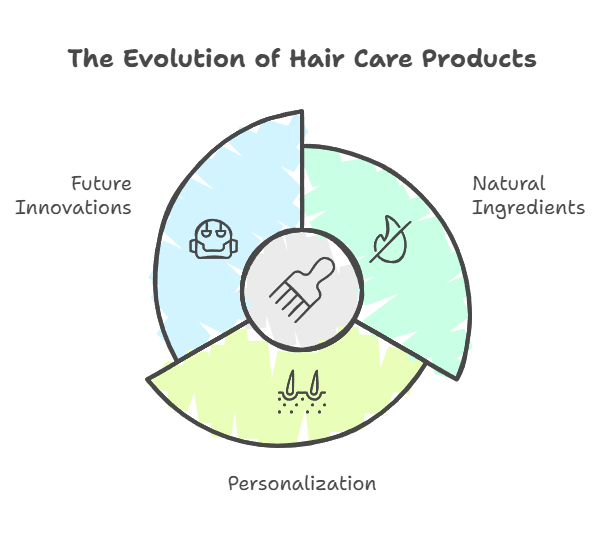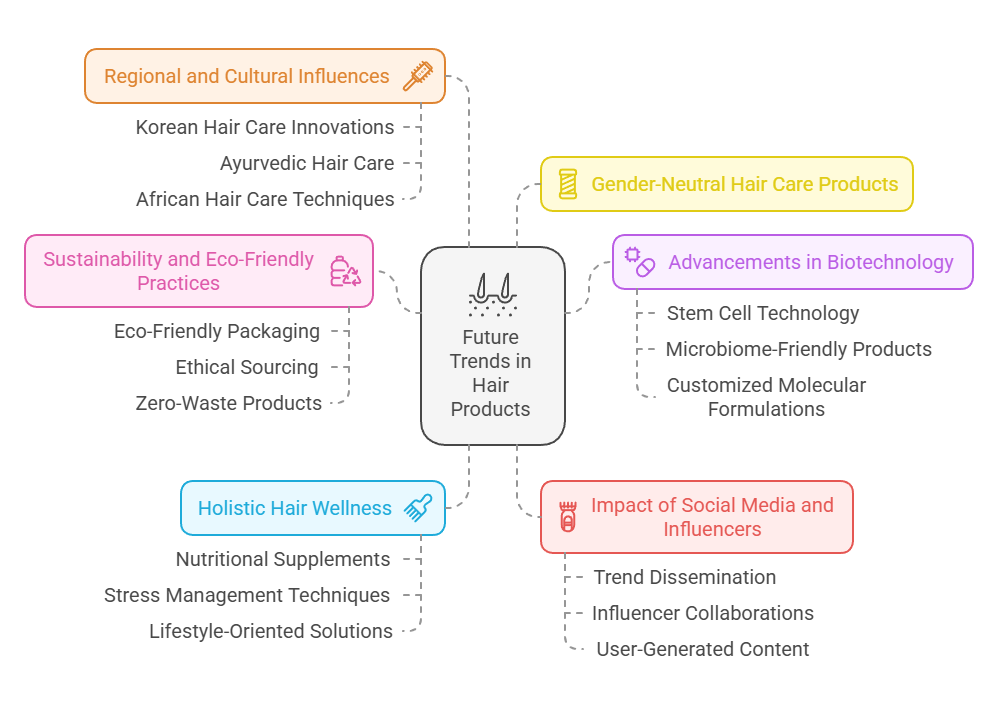Women and Men's Hair Products: Current Trends and Future Outlook
Women and Men's Hair Products: Current Trends and Future Outlook

The hair care industry has witnessed significant transformations over the years, catering to the diverse needs of both women and men. As we delve into the current trends and anticipate future developments, we aim to provide a comprehensive overview of the evolving landscape of hair products.
The Evolution of Hair Care
Hair has always been a symbol of personal identity and cultural expression. Historically, hair products were limited to basic cleansing agents and rudimentary styling solutions. Today, the industry has expanded exponentially, offering specialized products that address specific hair types, concerns, and styling preferences.
Current Trends in Women's Hair Products
.png)
Embracing Natural and Organic Ingredients
In recent years, there has been a significant shift towards natural and organic hair care products. Women are increasingly conscious of the ingredients they apply to their hair and scalp. We observe a growing demand for products free from sulfates, parabens, and synthetic fragrances. Brands are responding by formulating shampoos, conditioners, and treatments enriched with botanical extracts, essential oils, and plant-based proteins.
Personalized Hair Care Solutions
The one-size-fits-all approach is becoming obsolete. We notice a trend towards personalized hair care regimes tailored to individual hair profiles. Advanced diagnostic tools and online quizzes help consumers identify products that suit their unique hair texture, porosity, and scalp condition. This customization enhances efficacy and satisfaction, leading to a more loyal customer base.
Technological Advancements in Styling Tools
Innovation in styling tools has revolutionized how women manage their hair. From ceramic and tourmaline-infused flat irons to ionic hair dryers, these devices minimize heat damage while maximizing styling efficiency. We also see the integration of smart technology, where tools can adjust temperature settings based on hair type, ensuring optimal care during styling.
Focus on Scalp Health
Healthy hair starts with a healthy scalp. We are witnessing an increased emphasis on scalp treatments, including exfoliating scrubs, serums, and masks. Ingredients like tea tree oil, salicylic acid, and probiotics are being incorporated to address issues such as dandruff, dryness, and inflammation.
Current Trends in Men's Hair Products
.png)
The Rise of Men's Grooming Culture
Men's grooming has evolved beyond basic shaving and haircuts. We observe a burgeoning market for men's hair care and styling products. This shift is fueled by a changing perception of masculinity, where self-care and personal grooming are not only accepted but encouraged.
Specialized Hair Styling Products
Men are exploring a variety of hair styling products, including pomades, waxes, clays, and gels. Each product offers different hold strengths and finishes, catering to diverse hairstyles from slick backs to textured quiffs. We notice brands launching lines specifically designed to provide versatility and ease of use for men's styling needs.
Beard and Moustache Care
Facial hair care has become an integral part of men's grooming. We see a plethora of products such as beard oils, balms, and conditioners that nourish and style facial hair. These products often contain natural oils like jojoba and argan, which soften the hair and moisturize the skin beneath.
Emphasis on Hair and Scalp Health
Similar to women's trends, men are becoming more aware of the importance of scalp health. We notice an increase in products targeting issues like thinning hair and scalp sensitivity. Ingredients such as caffeine, biotin, and niacinamide are popular for their potential to stimulate hair growth and improve scalp circulation.
The Influence of Technology in Hair Care
Smart Hair Care Devices
Technology integration is a significant trend in the hair care industry. We are seeing the advent of smart hair brushes that analyze hair quality and scalp conditions, providing real-time feedback and personalized care recommendations. These devices often connect to mobile apps, allowing users to track their hair health over time.
Virtual Consultations and AI Recommendations
With the rise of e-commerce, virtual hair consultations have become more prevalent. Artificial intelligence and machine learning algorithms help consumers find suitable products based on uploaded photos and questionnaires. We believe this trend enhances the shopping experience by offering personalized advice without the need for in-person consultations.

Future Trends in Hair Products
Sustainability and Eco-Friendly Practices
Environmental consciousness is shaping the future of hair care. We anticipate a surge in sustainable practices, including:
-
Eco-Friendly Packaging: Brands are moving towards recyclable, biodegradable, or refillable packaging to reduce environmental impact.
-
Ethical Sourcing: Ingredients sourced through fair trade practices and sustainable farming are gaining prominence.
-
Zero-Waste Products: Solid shampoos and conditioners that eliminate the need for plastic bottles are becoming popular.
Advancements in Biotechnology
Biotechnology is paving the way for innovative hair care solutions. We foresee developments such as:
- Stem Cell Technology: Research into stem cells may lead to breakthroughs in treating hair loss and promoting regeneration.
- Microbiome-Friendly Products: Formulations that support the scalp's natural microbiome could improve overall hair health and prevent issues like dandruff and irritation.
- Customized Molecular Formulations: Tailoring products at a molecular level to address specific hair needs is a possibility on the horizon.
Gender-Neutral Hair Care Products
The lines between gender-specific products are blurring. We expect a rise in gender-neutral hair care options that focus on individual hair needs rather than traditional gender marketing. This approach promotes inclusivity and recognizes the diverse spectrum of hair types and preferences.
Holistic Hair Wellness
The concept of holistic wellness is extending to hair care. We anticipate an integration of:
- Nutritional Supplements: Vitamins and supplements targeting hair health from within.
- Stress Management Techniques: Understanding the impact of stress on hair, we may see products and services that incorporate relaxation and mindfulness.
- Lifestyle-Oriented Solutions: Recommendations that encompass diet, exercise, and sleep to improve hair condition.
The Impact of Social Media and Influencers
Social media platforms play a pivotal role in shaping consumer behavior. We observe that:
- Trend Dissemination: New styles and products gain rapid popularity through viral content.
- Influencer Collaborations: Brands partner with influencers to reach targeted audiences, creating authentic connections.
- User-Generated Content: Real-life testimonials and reviews influence purchasing decisions more than traditional advertising.
Regional and Cultural Influences
Globalization has made diverse hair care practices more accessible. We note:
- Korean Hair Care Innovations: The K-beauty wave brings multi-step hair routines and unique ingredients like fermented rice water.
- Ayurvedic Hair Care: Traditional Indian practices using herbs like amla, bhringraj, and neem are gaining international interest.
- African Hair Care Techniques: Protective styling and products catering to textured hair are becoming mainstream.
Challenges Facing the Hair Care Industry
While the future holds promise, we must acknowledge challenges such as:
- Regulatory Hurdles: Navigating the complex regulations regarding ingredient safety and product claims across different regions.
- Consumer Skepticism: Educating consumers amidst misinformation and exaggerated marketing claims.
- Supply Chain Disruptions: Ensuring consistent ingredient sourcing in the face of global events affecting trade and production.
The Role of Professional Salons
Professional salons continue to influence trends and product popularity. We recognize that:
- Expert Recommendations: Stylists provide personalized advice that significantly impacts consumer choices.
- Exclusive Product Lines: Many salons offer professional-grade products not available in retail stores.
- Education and Training: Salons serve as hubs for learning about new techniques and products.
Conclusion
The hair care industry is at an exciting juncture, characterized by innovation, personalization, and a holistic approach to hair health. As we continue to adapt to consumer needs and technological advancements, we believe that the future of hair products will be more inclusive, sustainable, and effective than ever before. By staying attuned to these trends, we can contribute to a future where everyone can achieve their desired hair goals with confidence and care.
Share this content

